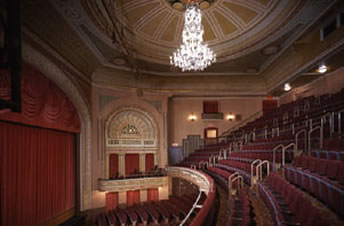Ethel Barrymore Theatre / NYC

The Ethel Barrymore Theatre is the only surviving theatre of the many
Lee and J.J. Shubert built for performers who were affiliated with them.


Ethel Barrymore, in 1896 and 1959
Ethel Barrymore was part of the renowned Barrymore acting dynasty, and her tremendous popularity
in New York and London society established her as a household name in the US and England.
She had achieved stardom under the management of producer Charles Frohman beginning in 1901.
In 1928, the Shuberts offered to build her a theatre and commission a new play for her.
Ethel Barrymore’s premiere at her theatre was The Kingdom of God in December 1928.
In April, she opened in another vehicle, The Love Duel (1929), and then toured the country in both,
not returning to her theatre until Scarlett Sister Mary (1930). She followed this with a revival of
The School for Scandal (1931), her last show under her Shubert contract. Her final appearance
at her theatre was in 1940, in An International Incident.

Even without Barrymore herself, the theatre was home to many successes in the 1930s and 40s. Fred Astaire starred
in Cole Porter’s Gay Divorce (1932), and Noel Coward wrote, produced and staged two plays with Alfred Lunt
and Lynne Fontanne: Design for Living (1933) and Point Valaine (1935). Other notable productions include
Death Takes a Holiday (1929), Clare Booth Luce’s The Women (1936), Rodgers and Hart’s Pal Joey (1940)
starring Gene Kelly, and Tennessee William’s A Streetcar Named Desire (1947) with Jessica Tandy and Marlon Brando.

The second half of the 20th century proved even more star-studded. Jessica Tandy and Hume Cronyn played in
The Fourposter (1951), Anthony Perkins received a Tony nomination for his role in Look Homeward, Angel (1957),
Sidney Poitier and Ruby Dee starred in Lorraine Hansberry’s A Raisin in the Sun (1959), Lee Remick appeared in
Wait Until Dark (1966), Robert Duvall starred in David Mamet’s American Buffalo (1977), and August Wilson
presented his Tony Award winning Best Play Joe Turner’s Come and Gone (1988). Among other prominent shows and
performers at the at the Barrymore were Peter Shaffer’s Lettice & Lovage (1990), starring Maggie Smith and
produced by the Shubert Organization, and Wendy Wasserstein’s The Sisters Rosenzweig (1993), with a
scene-stealing performance by Madeline Kahn. Kathleen Turner and Jude Law came to Broadway in Indiscretions (1995)
and Dame Judi Dench starred in David Hare’s Amy’s View (1999).
Other productions at the Barrymore include an acclaimed revival of Tom Stoppard’s The Real Thing (2000);
Charles Busch’s comedy The Tale of the Allergist’s Wife (2000) starring Linda Lavin; Oscar Wilde’s Salome
(2003) with Al Pacino, Marissa Tomei, Dianne Wiest, and David Strathairn; the Tony Award winning revival of
Stephen Sondheim’s Company (2006); More recent productions include Exit the King (2009) starring
Tony Award winner Geoffrey Rush and Susan Sarandon, and David Mamet's Race (2009).

The Barrymore is the last theatre Lee and J.J. Shubert built. Designed by Herbert Krapp, its exterior was modeled
on the design of public baths in Rome, with a two-story terra-cotta grillwork screen. The interior decor combines
Elizabethan, Mediterranean, and Adamsesque styles. The most elaborate interior element is the boxes, which feature
a sunburst pattern over a columned portico.
